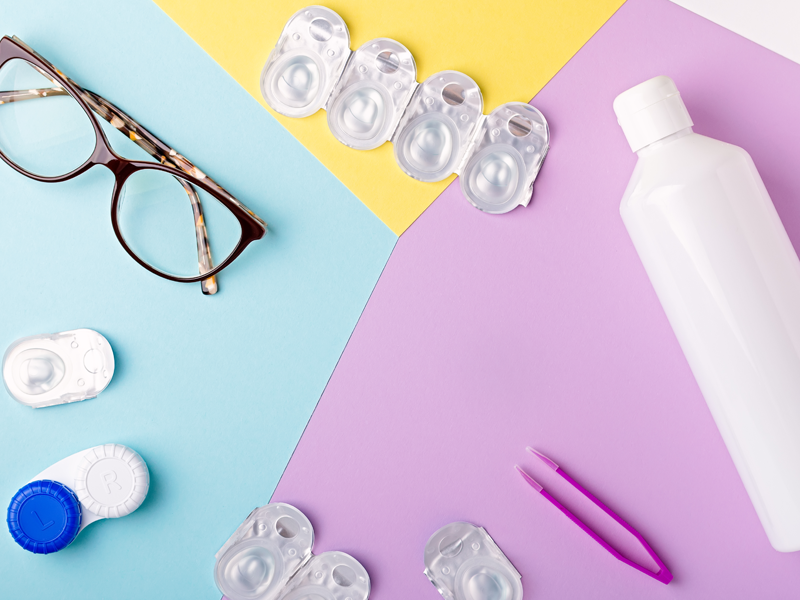
How to Safely Wear Contact Lenses – Contact Lens Safety Awareness Month
Spooky season is here! Your porch might be decked out in pumpkins, ghosts, or skeletons. The stores are filled with costumes and accessories to make your Halloween a memorable one. Whether you are a werewolf or vampire this October, if you are planning to add contact lenses to your attire – or wear them for daily use – it’s important to know the do’s and the dont’s to keep your eyes safe and healthy.
Get the Right Costume Contacts
If achieving the perfect look this Halloween requires wearing decorative contact lenses, keep in mind they are medical devices regulated by the FDA and correct wear can prevent serious eye problems. Contact lenses should always have a prescription and never be purchased from a Halloween novelty store, beauty supply store, flea market, boutique, convenience store, or online if a prescription isn’t required. If they aren’t used correctly, you can be at risk of developing corneal abrasions (cut or scratch on the top layer of the eye), infections, itchy, watery eyes, vision loss, and even blindness.
Proper fit of your costume contact lenses is also very important because an improper fit can damage your eyes. Your eye doctor can help you find the right fit and prescription through a contact lens exam, give you cleaning and care instructions, and make sure you keep your eyes as safe as possible this Halloween. Contact your local Midwest Eye Consultants right away if you have signs like redness, eye pain, or a decrease in vision.
Important tip: If you plan on buying decorative contact lenses elsewhere, be sure they are FDA-approved and require a prescription.
Daily Wearer? Keep Your Eyes Safe with These Contact Lens Use Tips
Safe contact lens use is not only important around Halloween, but year-round if you are a daily wearer. Wearing contact lenses is a commitment to keeping your eyes healthy, so check out the following tips on safe wear to decide if they are right for you.
- Never share your contact lenses.
- Don’t mix old contact lens disinfecting solution with new. Always dump the old and add the new solution.
- Only use eye drops while wearing contact lenses if they are specifically recommended by your eye doctor.
- Clean and store your contact lenses properly, and never wear them if they have been stored for more than a month without disinfecting.
- Wash your hands with soap and water, and dry them, before handling your contact lenses.
- Water and contact lenses don’t mix. Don’t store your lenses in the water and don’t swim or shower while wearing them.
- Replace your contact lenses as often as recommended by your optometrist.
- Replace your contact lens case at least once every three months.
The American Academy of Ophthalmology has several additional tips for safe contact lens wear and handling. Visit their Contact Lens Care page for more information.
Keep a Spare Pair of Glasses
If you run into problems with your contact lenses or develop an eye infection, keeping a pair of glasses on hand is a necessity. Having a spare pair of specs will keep you prepared in case of a torn contact lens, a prescription that expires, or other situations where you might need them. If you have any other questions about safe contact lens wear, your prescription, or our eyewear selection, schedule an appointment online.
Are you a Midwest Eye Consultants patient in need of a contact lens reorder? We are committed to keeping our patients safe and healthy during this time. We’re still offering online contact lens reorders and shipping. Get more information here.
Hello! I just recently started thinking about buying contact lenses in place of glasses. Glasses are not always comfortable to wear. For example, in winter, glasses fog up from temperature changes. In rainy weather it is not possible at all to look normally through glasses. And then there is only one way out, to buy content lenses. After reading the article, I realized that I didn’t know everything about contact lenses. For example, that you cannot take a shower or swim in the pool with contact lenses. But what scared me the most was that it was possible to go blind from bad contact lenses. Thank you very much for sharing such useful information.
Thank you for providing these useful tips, Leslie! In comparison to eyeglasses, contact lenses can improve visual acuity and give a broader and better field of view. However, contact lenses put wearers at risk of infection, dry eyes, ocular damage, irritation, and redness if adequate hygiene is not maintained.
Hello,
The way you explain a complex topic in an easy-to-understand way is really impressive.
Also visit our website:
Best Ophthalmologist Specialist